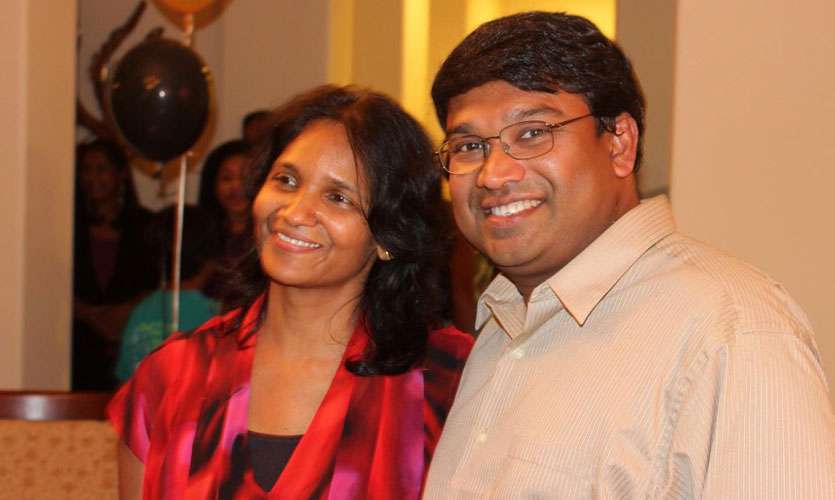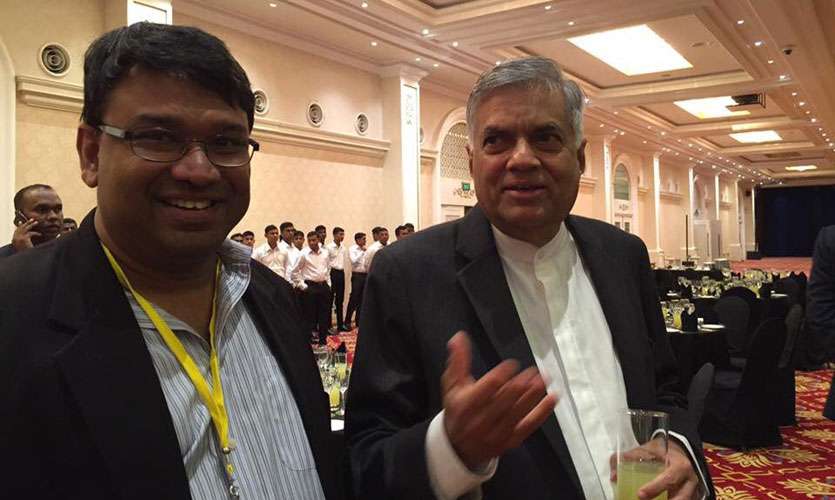Sep 25 2018.
views 43404“I am not the richest person in the world, or the smartest person. But the richest person in the world called me the smartest person at Princeton University and a fellow Sri Lankan friend who influenced his life choice while an undergraduate. You are all probably wondering, ‘who is he’?”
Dr. Yasantha Rajakarunanayake narrates, by way of introducing himself. He’s not wrong. Ever since a video emerged of Amazon.com founder Jeff Bezos describing Yasantha as the “smartest guy at Princeton” during a talk at The Economic Club of Washington, netizens were on a quest to uncover the genius that solved a mathematical problem that defeated Bezos, who ultimately gave up his dreams of becoming theoretical physicist. The world has Yasantha to thank for inadvertently being the reason we have Amazon.com.

Yasantha has been married for 26 years with two children, and currently resides and works in Silicon Valley. While to a majority, Yasantha is someone who solved a tough mathematical problem for Bezos, his achievements in the field are commendable and awe inspiring. Yasantha shared his life, his achievements, valuable advice for Sri Lankan youth, and of course, his thoughts on the fateful video that shone the world’s spotlight on him.
Tell us a little bit about yourself. What was your life like, growing up?
I grew up in Ratmalana, Sri Lanka, in a very middle class family. My mother Mrs. Ethel Rajakarunanayake was a school teacher in St. Mary’s college, Dehiwala and later the Vice Principal. My father was Mr. Hilary Rajakarunanayake, who worked as an accountant in the Middle East, and later was Deputy Editor of the Daily News newspaper for sometime before retiring. Both have passed away now. I attribute my academic success to my mother who spent a lot of time with me teaching and encouraging me in my early childhood, explaining how the world worked. My father taught me to think outside the box, be a risk taker, and of other success factors that are non-academic.
You completed your initial education in Sri Lanka before moving to the US
I was fortunate to get a scholarship to one of the best high schools in Sri Lanka, Royal College, and later received one of the highest marks in the AL exam with 4As in the mathematics stream. Although I attended the University of Moratuwa in Electronics engineering for a few months in the first year, I received a scholarship to go to my dream university, Princeton and left Sri Lanka in 1982 to pursue my undergraduate education. That is where I met Jeff Bezos.
Were you always inclined towards the IT field?
When I was growing up I had bad asthma, and my father said that I have to find a career that has an air conditioned office so I don’t have to breathe dusty air while working. Those days, computers (mainframes) were the only things in air conditioned rooms, and I quite accidentally chose it for this reason. At the time we could not predict computers would one day change the world, and there would be an Internet etc. It was a very fortunate choice.
You studied at Princeton and Caltech, top tier schools for your field. How was that experience like? How was your experience affected / or not because you were Sri Lankan?
I finished my undergraduate studies as an Electrical Engineering and Computer Science major in 1985 and went on to get a Ph.D. in Applied Physics at Caltech. Growing up, my heroes in science were Albert Einstein, (who worked at Princeton) and Richard Feynman (who worked at Caltech). I am thankful for having the opportunities to study at these world class institutions. It was very clear to me that the reason why I first came to America was to pursue the best education and knowledge in the world and not just to make lot of money. Money and success came later, but first and foremost, what USA offered me was an opportunity to advance my knowledge.
When I first came to the US as a foreign student, I didn’t know the culture well, I was poor in English, and didn’t know cool jokes etc. to make friends. So I helped lots of students with difficult homework, and it made me a ton of appreciative and lasting friendships. Jeff Bezos just happened to be one of them, and who gave credit for it. Helping someone with something as simple as homework can have a lasting impact on people's lives. That is why you are interested in my story today.
You were a professor before switching careers. Tell us about that.
After working few years as a university professor in Physics and semiconductors with more than 50 odd technical publications, I changed my career and jumped into Internet technology in 1995 since I saw the opportunity for Broadband Internet. I worked initially on the world's first Cable Modems and broadband networks, but cable infrastructure was not widely available worldwide. So I later did pioneering DSL modems, protocols, and ADSL networks as it allowed the broadband Internet to be deployed over existing phone lines in the world. In 2000 I started my own company with a cloud based content delivery technology, but it was too early for robust success as a market had not yet developed for cloud based content delivery. (The right time for cloud tech is now, eighteen years later). After this, later I worked at Broadcom Corporation, developing digital satellite communication chips and protocols. This is what gives you a satellite television. When this field was mature in 2008, I switched to WiFi for research and development of yet another promising technology. One of my successes was to work on fundamentals of wireless communications, and bring WiFi to all the smartphones and TVs through Broadcom chips. If you have an iPhone or Samsung phone, you are using a chip or product that I worked on and contributed to, in a fundamental way. Once WiFi reached its 5th generation iteration, I left Broadcom and joined the Taiwanese semiconductor chip giant Mediatek to research and develop Artificial Intelligence chips and algorithms, and also on mmWave radar innovations and autonomous driving applications.

While many people know you as the smart guy Bezos was talking about, there's a lot they don't know about you. Like the many issued and pending US patents, for one.
In my 30 year career as a high tech scientist and researcher, over the years I have contributed to several fundamental technologies of the Internet and Mobile ecosystem. I think what distinguishes me is that I changed my field many times successfully, and explored and contributed in many key technological innovations to the advancement of technology. To date, I am the inventor of 54 US patents, many EU and Chinese patents and another 40 or so pending US patent applications.
So you wake up one day and suddenly, everyone's talking about you. Walk us through that day.
A couple of days after Jeff Bezos talked about me by name on the 13th of September, (which I didn’t know at the time), my email and social networking were getting a lot of requests and people were asking ‘Are you Jeff Bezos Yoshantha’. They had misspelled my name and also it had no apostrophe on Bezos. So surely I thought someone had hacked all my email and social media accounts. Later when I came home, I very carefully clicked on the link, because I did not know if it was a computer virus. I was very pleasantly surprised to see Jeff talk about me in fond terms, with high regard. He did not have to do that. It shows humility in Jeff Bezos as well, currently the world's richest person. I ran upstairs and showed it to my wife and daughter who were delighted. I quickly used twitter and tweeted (my first tweet ever, although I use it to read and keep up to date on news for past 5 years) that ‘you would not have Amazon if it weren’t for me, since Jeff Bezos would have gone on to do physics, and the world would be a different place’. This went viral – and everyone loved the story, and the humanity of this all over the world. That was a day of fame for 24 hours.
You have achieved considerable success. What advice would you give those choosing to follow their dreams and make a name for themselves?
I consider myself an accomplished technologist, senior researcher and an innovator. When the initial research fields become developed and mature, I boldly switched fields. It is not so easy to do this, and many times I have failed interviews in the new field. But I persevered and tried again and again and until I achieved the exciting next job. I encourage everyone to do this if you are bored or getting stale in your current job. It is well worth the effort.
Any final thoughts?
I want to end with a couple of words of inspiration. The first quality that made me successful is ‘unrelenting curiosity’ to seek the truth and understand it all my life, which I learned from my father. He taught me to work smart. Second is ‘hard work’ which I learned from my mother. She taught me to work hard and persevere all my life. The combination is what has made me successful. I recommend it to every young person. You see, curiosity does not kill the cat, but with hard work and perseverance helps you find the rat! Last but not least I am thankful to my parents, and the excellent education system of Sri Lanka, and the wonderful teachers from Sri Lanka who instilled in me my best qualities, values and developed my knowledge and skills.
Yasantha's twitter handle - https://twitter.com/yasantha62
1 Comments
Austra says:
Jun 22, 2024 at 05:12 amThanks for the interview. Reading from Nigeria. I was curious about the face behind the name. Now my search paid off. And you made it possible. Thanks again.